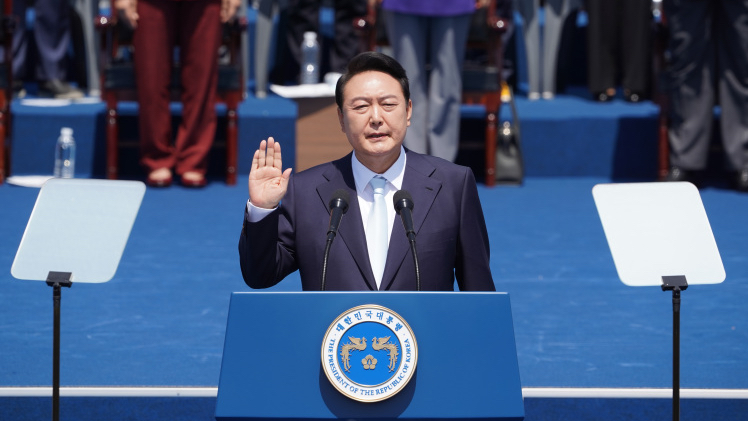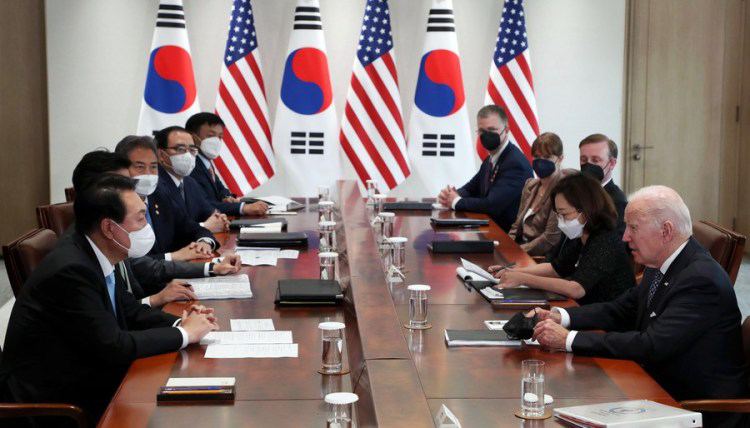
Yoon Suk-yeol is sworn in as South Korea's president during the inaugural ceremony in the National Assembly plaza in Seoul, South Korea, May 10, 2022. /Xinhua
Yoon Suk-yeol is sworn in as South Korea's president during the inaugural ceremony in the National Assembly plaza in Seoul, South Korea, May 10, 2022. /Xinhua
Editor's note: Hamzah Rifaat Hussain is a host for ThinkTech Hawaii. The article reflects the author's opinions and not necessarily the views of CGTN.
South Korean President Yoon Suk-yeol's visit to Washington D.C. to hold a summit with U.S. President Joe Biden comes at an important juncture for both countries as this year marks the 70th anniversary of the countries' alliance.
Equally critical, however, is for the Yoon administration to demonstrate prudence and not leverage this visit as an opportunity to pursue unwarranted and unfortunate provocations which impact stability in the Asia-Pacific region and create divisions among regional states. For a country that has witnessed its foreign policy being historically impacted by the end of the Cold War, the legacy of right-wing governance since the founding of the Republic of Korea in 1948 and America's obsession with regional security, better sense should prevail.
This trip is the first state visit by a South Korean President since 2011 with discussions slated to be on tackling the Democratic People's Republic of Korea's (DPRK) missile tests, building sound supply chains and expanding cooperation in high-tech areas including chip and batteries. According to South Korean Deputy National Security Advisor Kim Tae-hyo, the visit will further solidify combined defense postures and extended deterrence between the two countries in a more concrete manner. Discussions on deterrence which single out any sovereign state or detract from more immediate issues for South Korea would be counterproductive.
Note that, President Yoon is being accompanied by top conglomerate chiefs from South Korea who are expected to discuss economic issues facing the country including the introduction of the Chips and Science Act as well as the Inflation Reduction Act by the Biden administration. One of the main agenda items is to address uncertainties for Korean companies due to U.S. protectionism. Note further that it exists a lingering sentiment amongst corporations that the U.S. government needs to take more concrete measures to facilitate Korean companies given investments worth $10 billion in the American market.
Furthermore, South Korea's top memory chip makers such as Samsung Electronics and SK Hynix have been at the receiving end of the U.S. Chips and Science Act due to excessive subsidy eligibility requirements. As a result, the meeting with President Joe Biden should focus more on allaying domestic economic concerns for South Korea rather than partaking in America's foreign policy which seeks to divide the Asia-Pacific and pursue ideological confrontations.

South Korean President Yoon Suk-yeol (1st L) and U.S. President Joe Biden (1st R) hold their first summit talks in Seoul, South Korea, May 21, 2022. /Xinhua
South Korean President Yoon Suk-yeol (1st L) and U.S. President Joe Biden (1st R) hold their first summit talks in Seoul, South Korea, May 21, 2022. /Xinhua
The Yoon administration should also refrain from operating with a 1950s mindset when America operated with global hegemony while South Korea remained an impoverished country. In 2023, the realities remain starkly different. Many young South Koreans wish to see their country treated equally and practice an independent foreign policy that is devoid of alignment, great power competition and bloc politics.
President Yoon's meeting with Biden should factor in domestic dynamics such as protests against a U.S. missile base. The agitation centers on the presence of the Terminal High Altitude Area Defense Area (THAAD) that was deployed in 2017 and continues to generate war-like tensions with DPRK in 2023. There is hence, a need for course correction and an impartial outlook on peace and regional affairs during the visit to the United States.
Just before his departure to the U.S., President Yoon hinted that South Korea could provide weapons to Ukraine which came straight after insensitive comments on increased tensions around the Taiwan region being erroneously attributed to "attempts by China to change the status quo." The statement on Taiwan region blatantly disregarded the one-China principle and the universal consensus on it that is both respected and abided by the international community.
Additionally, the decision to cast South Korea as a non-regional NATO member state would be an unwise move from President Yoon during his visit to the United States given that NATO member states such as Germany and France have maintained close economic ties with China and Russia. For now, close to 160 Korean corporations are operating in Russia while China remains South Korea's top export destination and trade partner.
As a result, discussions in Washington D.C. that polarize rather than offer anything constructive will harm China-South Korea relations as well as stability in the Asia-Pacific. Partaking in the U.S. approach which promotes a so-called "democracy vs. autocracy" doctrine will go against Seoul's ideal framing of regional stability and its relationship with China as being all-inclusive and representing diverse political systems that can peacefully coexist. This must continue unabated.
The onus is on President Yoon to avoid divisiveness during his trip to the United States.
(If you want to contribute and have specific expertise, please contact us at opinions@cgtn.com. Follow @thouse_opinions on Twitter to discover the latest commentaries in the CGTN Opinion Section.)